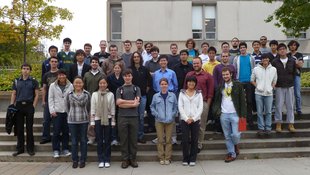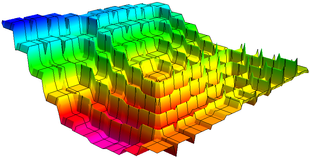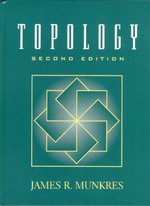10-327/About This Class: Difference between revisions
No edit summary |
No edit summary |
||
| (4 intermediate revisions by 3 users not shown) | |||
| Line 13: | Line 13: | ||
*Prerequisite: MAT257Y1/(MAT224H1, MAT237Y1, MAT246H1 and permission of the instructor) |
*Prerequisite: MAT257Y1/(MAT224H1, MAT237Y1, MAT246H1 and permission of the instructor) |
||
'''A more detailed''', and a little different, by-the-week plan is in {{Pensieve Link| |
'''A more detailed''', and a little different, by-the-week plan is in {{Pensieve Link|Classes/10-327|my own notes}}, though note that it is an '''optimistic''' plan, and in reality we will likely cover a bit less. |
||
[[Image:10-327-Munkres_Cover.jpg|left|150px]] |
[[Image:10-327-Munkres_Cover.jpg|left|150px]] |
||
===Text Book(s)=== |
===Text Book(s)=== |
||
Our main text book will be ''Topology'' (second edition) by James Munkres, ISBN 978-0131816299. It is a required reading. |
Our main text book will be ''Topology'' (second edition) by James Munkres, ISBN 978-0131816299. It is a required reading. The topology texts by Dugundji and Massey are also recommended, and many other texts are also available. (A useful principle to know is that many math texts are available online. Web search for (name of text + name of author + pdf or djvu). |
||
===Wiki=== |
===Wiki=== |
||
| Line 47: | Line 48: | ||
Good deed points will count towards your final grade! If you got <math>n</math> of those, they are solidly yours and the above formula for the final grade will only be applied to the remaining <math>100-n</math> points. So if you got 25 good deed points (say) and your final grade is 80, I will report your grade as <math>25+80(100-25)/100=85</math>. Yet you can get an overall 100 even without doing a single good deed. |
Good deed points will count towards your final grade! If you got <math>n</math> of those, they are solidly yours and the above formula for the final grade will only be applied to the remaining <math>100-n</math> points. So if you got 25 good deed points (say) and your final grade is 80, I will report your grade as <math>25+80(100-25)/100=85</math>. Yet you can get an overall 100 even without doing a single good deed. |
||
The formula for considering good deed points is <math>n+m(100-n)/100</math>, where <math>n</math> is the number of good deed points and <math>m</math> is the mark before considering good deeds. It may be helpful to note that this can also be expressed as <math>m+(n/100)*(100-m)</math>. |
|||
'''Important.''' For your good deeds to count, you '''must''' do them under your own name. So you must set up an account for yourself on this wiki and you must use it whenever you edit something. I will periodically check [[Special:Recentchanges|Recent changes]] to assign good deeds credits. Those credits will be made public (good deeds are public as a whole) towards the end of the course, at [[10-327/Register of Good Deeds]]. |
'''Important.''' For your good deeds to count, you '''must''' do them under your own name. So you must set up an account for yourself on this wiki and you must use it whenever you edit something. I will periodically check [[Special:Recentchanges|Recent changes]] to assign good deeds credits. Those credits will be made public (good deeds are public as a whole) towards the end of the course, at [[10-327/Register of Good Deeds]]. |
||
Latest revision as of 15:18, 30 September 2010
| ||||||||||||||||||||||||||||||||||||||||||||||||||||||||||||
Crucial Information
Agenda: Understand "continuity" in the most abstract, learn about "the fundamental groups" and maybe touch "surfaces".
Instructor: Dror Bar-Natan, drorbn@math.toronto.edu (Wiki before Email!), Bahen 6178, 416-946-5438. Office hours: by appointment.
Classes: Mondays 2-3 and Thursdays 2-4 in Sydney Smith 1070.
| Teaching Assistant: David Reiss, david.reiss@utoronto.ca, SS 622. |
URL: https://drorbn.net/drorbn/index.php?title=10-327.
Abstract
Taken from the Faculty of Arts and Science Calendar:
Metric spaces, topological spaces and continuous mappings; separation, compactness, connectedness. Topology of function spaces. Fundamental group and covering spaces. Cell complexes, topological and smooth manifolds, Brouwer fixed-point theorem.
- Prerequisite: MAT257Y1/(MAT224H1, MAT237Y1, MAT246H1 and permission of the instructor)
A more detailed, and a little different, by-the-week plan is in my own notes, though note that it is an optimistic plan, and in reality we will likely cover a bit less.
Text Book(s)
Our main text book will be Topology (second edition) by James Munkres, ISBN 978-0131816299. It is a required reading. The topology texts by Dugundji and Massey are also recommended, and many other texts are also available. (A useful principle to know is that many math texts are available online. Web search for (name of text + name of author + pdf or djvu).
Wiki
The class web site is a wiki, as in Wikipedia - meaning that anyone can and is welcome to edit almost anything and in particular, students can post notes, comments, pictures, whatever. Some rules, though -
- This wiki is a part of my (Dror's) academic web page. All postings on it must be class-related (or related to one of the other projects I'm involved with).
- You must login to edit. To get an account, email me your preferred login name, your real name and your email address if different from the address you are writing from.
- Criticism is fine, but no insults or foul language, please.
- I (Dror) will allow myself to exercise editorial control, when necessary.
- The titles of all pages related to this class should begin with "10-327/" or with "10-327-", just like the title of this page.
- Some further editing help is available at Help:Contents.
Marking Scheme
There will be one term test (25% of the total grade) and a final exam (50%), as well as about 9 homework assignments (25%).
The Term Test
The term test will take place in class on Thursday October 28th, 2-4PM. A student who misses the term test without providing a valid reason (for example, a doctor’s note) within one week of the test will receive a mark of 0 on the term test. There will be no make-up term test. If a student misses the term test for a valid reason, the weight of the problem sets will increase to 35% and the weight of the final exam to 65%.
Homework
Assignments will be posted on the course web page and distributed in class (usually on Thursdays) approximately on the weeks shown in the class timeline. They will be due a week later and they will be (at least partially) marked by the TA. All students (including those who join the course late) will receive a mark of 0 on each assignment not handed in; though in computing the homework grade, your worst two assignments will not count. I encourage you to discuss the assignments with other students or even browse the web, so long as you do at least some of the thinking on your own and you write up your own solutions. Remember that cheating is always possible and may increase your homework grade a bit. But it will hurt your appreciation of yourself, your knowledge, and your exam grades a lot more.
Good Deeds
Students will be able to earn up to 25 "good deeds" points throughout the year for doing services to the class as a whole. There is no pre-set system for awarding these points, but the following will definitely count:
- Drawing a beautiful picture to illustrate a point discussed in class and posting it on this site.
- Taking class notes in nice handwriting, scanning them and posting them here.
- Typing up or formatting somebody else's class notes, correcting them or expanding them in any way.
- Writing an essay on expanding on anything mentioned in class and posting it here; correcting or expanding somebody else's article.
- Doing anything on our 10-327/To do list.
- Any other service to the class as a whole.
Good deed points will count towards your final grade! If you got [math]\displaystyle{ n }[/math] of those, they are solidly yours and the above formula for the final grade will only be applied to the remaining [math]\displaystyle{ 100-n }[/math] points. So if you got 25 good deed points (say) and your final grade is 80, I will report your grade as [math]\displaystyle{ 25+80(100-25)/100=85 }[/math]. Yet you can get an overall 100 even without doing a single good deed.
The formula for considering good deed points is [math]\displaystyle{ n+m(100-n)/100 }[/math], where [math]\displaystyle{ n }[/math] is the number of good deed points and [math]\displaystyle{ m }[/math] is the mark before considering good deeds. It may be helpful to note that this can also be expressed as [math]\displaystyle{ m+(n/100)*(100-m) }[/math].
Important. For your good deeds to count, you must do them under your own name. So you must set up an account for yourself on this wiki and you must use it whenever you edit something. I will periodically check Recent changes to assign good deeds credits. Those credits will be made public (good deeds are public as a whole) towards the end of the course, at 10-327/Register of Good Deeds.
Class Photo
To help me learn your names, I will take a class photo on Thursday of the third week of classes. I will post the picture on the class' web site and you will be required to send me an email and identify yourself in the picture or to identify yourself on the Class Photo page of this wiki.
Accessibility Needs
The University of Toronto is committed to accessibility. If you require accommodations for a disability, or have any accessibility concerns about the course, the classroom or course materials, please contact Accessibility Services as soon as possible: disability.services@utoronto.ca or http://studentlife.utoronto.ca/accessibility.



